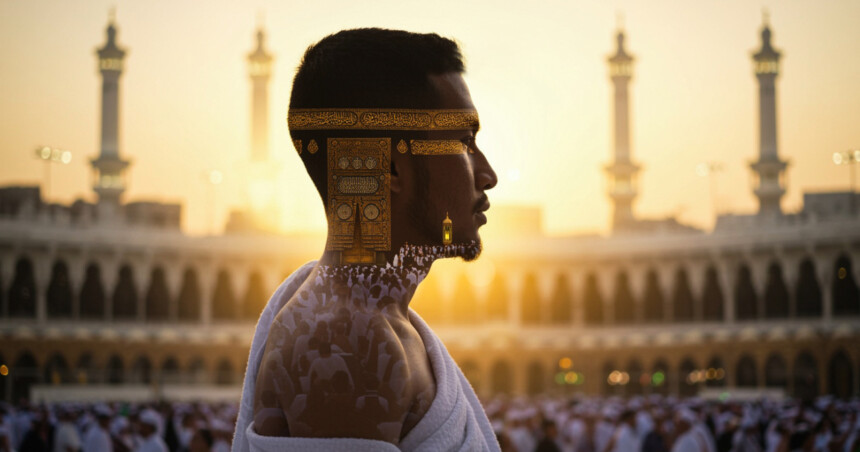From Allah’s love for this Ummah and His mercy toward it is that no season of worship ends except that it is swiftly followed by another.
You finish your five daily prayers and long to pray more — He gives you the stillness and solitude of the night to stand before Him. You complete Hajj and your heart yearns for Makkah once again — He grants you the gift of ʿUmrah.
You fear your deeds will never match those of previous nations because of your shorter lifespan — He gives you Laylat al-Qadr, a single night worth more than a thousand months of worship.
The door towards eternal bliss
It wasn’t long ago that we bid farewell to the blessed month of Ramadan, only to be greeted immediately by the six days of Shawwal — another season of worship, another divine gift. We fasted those days, benefitted from them, then moved on.
And now, before we’ve even settled, we find ourselves standing at the gates of yet another opportunity.
This is because Allah intends to open wide the doors for those who seek the highest ranks in the Hereafter, truly lavishing the believers.
It is a constant outpouring of divine mercy — a love that continues to surround this Ummah, season after season, without interruption.
The most beloved nation to Allah is this Ummah
The Prophet ﷺ said,
أنتم موفون سبعين أمة، أنتم خيرُها وأكرمُها على الله
You are the completion of seventy nations. You are the best and most honoured of them before Allah.” [1]
So do not be deceived by the Ummah’s current state of weakness, nor disheartened by the betrayal of hypocrites or the long road still ahead. This Ummah was, is, and will always be the most beloved nation to Allah.
And if ever your conviction wavers, just look around: every other nation — no matter how advanced or powerful — has turned its back on the core truth. They no longer uphold His Oneness, nor do they pray, fast, give zakat, or recite His Book.
But one nation still does all of the above, still raises its voice, day and night, with lā ilāha illa Allah. And that nation is yours!
Ten days of Dhul Hijjah are the greatest days of life
We’re already halfway through the ten greatest days of the Islamic year. And while they may feel like any other day on the surface, these days are anything but ordinary.
They were honoured by Allah and His Messenger ﷺ in ways no other days were; one of which was that Allah Himself swore by them in the Qur’ān.
And Allah only swears by what is truly great.
Indeed, Allah says,
وَٱلْفَجْرِ ١ وَلَيَالٍ عَشْرٍ ٢
By the dawn, and by the ten nights.” [2]
Ibn Kathīr said,
وَاللَّيَالِي الْعَشْرِ: أَيْ عَشْرِ ذِي الْحِجَّةِ كَمَا قَالَهُ ابْنُ عَبَّاسٍ وَابْنُ الزُّبَيْرِ وَمُجَاهِدٌ وَغَيْرُهُمْ مِنَ السَّلَفِ وَالْخَلَفِ.
The ten nights refer to the first ten days of Dhul Hijjah, as stated by Ibn ʿAbbās, Ibn al-Zubayr, Mujāhid, and many others from among the early and later generations.” [3]
First days of Dhul Hijjah and last nights of Ramadan
Scholars have long discussed the question of which of the above is greater.
Among the most balanced views is that the first ten days of Dhul Hijjah are superior to the days of the last ten of Ramadan, while the nights of the last ten of Ramadan are superior to the nights of Dhul Hijjah.
This perspective harmonises the texts that praise both seasons.
- The nights of Ramadan are crowned by Laylat al-Qadr, the single greatest night of the year.
- The days of Dhul Hijjah are unmatched in their collective virtue — containing the Day of ʿArafah and the Day of Sacrifice (Yawm al-Nahr).
These days are honoured by a number of oaths
Allah says,
وَٱلشَّفْعِ وَٱلْوَتْرِ
By the even and the odd.” [4]
Ibn ʿAbbās said,
ٱلشَّفْعُ يَوْمُ ٱلْأَضْحَى، وَٱلْوَتْرُ يَوْمُ عَرَفَةَ
The ‘even’ is the Day of al-Adha (10th Dhul Hijjah), and the ‘odd’ is the Day of ʿArafah (9th Dhul Hijjah).” [5]
This was also the view of ʿIkrimah and al-Dahhāk.
Again, Allah honours these days in another oath:
وَشَاهِدٍ وَمَشْهُودٍ
By the witnessing and the witnessed.” [6]
The Prophet ﷺ explained this verse in detail, saying:
ٱلْيَوْمُ ٱلْمَوْعُودُ يَوْمُ ٱلْقِيَامَةِ، وَٱلْيَوْمُ ٱلْمَشْهُودُ يَوْمُ عَرَفَةَ، وَٱلشَّاهِدُ يَوْمُ ٱلْجُمُعَةِ
The promised day is the Day of Resurrection, the witnessed day is the Day of ʿArafah, and the witnessing day is Friday.” [7]
Allah says,
وَأَذِّنْ فِي ٱلنَّاسِ بِٱلْحَجِّ يَأْتُوكَ رِجَالٗا وَعَلَىٰ كُلِّ ضَامِرٖ يَأْتِينَ مِن كُلِّ فَجٍّ عَمِيقٖ ﴿٢٧﴾ لِّيَشْهَدُواْ مَنَـٰفِعَ لَهُمْ وَيَذْكُرُواْ ٱسْمَ ٱللَّهِ فِيٓ أَيَّامٖ مَّعْلُومَـٰتٍ
And proclaim the Hajj to mankind — they will come to you on foot and on every lean camel; coming from every deep mountain pass.
That they may witness benefits for themselves, and mention the Name of Allah during known days…” [8]
What are these “known days” in which Allah commands us to remember Him?
Ibn ‘Abbas said,
هِيَ أَيَّامُ الْعَشْرِ
They are the first ten days of Dhul Hijjah.” [9]
A season of completion and renewal
It was reported from a group of the early generations that Allah spoke directly to Mūsā (ʿalayhi al-Salām) on the last day of the ten days of Dhul Hijjah, after the completion of the appointed period of forty nights.
Allah says,
وَوَاعَدْنَا مُوسَى ثَلَاثِينَ لَيْلَةً وَأَتْمَمْنَاهَا بِعَشْرٍ
And We appointed for Moses thirty nights and completed them with ten [more].” [10]
It was said that the ten nights added, to complete the forty, were the first ten days of Dhul Hijjah. [11]
It was during these ten days — specifically the ninth, the Day of ʿArafah — that Allah completed and perfected this religion for us.
He revealed,
ٱلۡيَوۡمَ أَكۡمَلۡتُ لَكُمۡ دِينَكُمۡ وَأَتۡمَمۡتُ عَلَيۡكُمۡ نِعۡمَتِي وَرَضِيتُ لَكُمُ ٱلۡإِسۡلَـٰمَ دِينٗا
This day I have perfected your religion for you, completed My favour upon you, and have chosen for you Islam as your religion.” [12] [13]
When was this verse revealed?
‘Umar ibn al-Khattāb said,
قَدْ عَرَفْنَا ذَلِكَ الْيَوْمَ، وَالْمَكَانَ الَّذِي نَزَلَتْ فِيهِ عَلَى النَّبِيِّ صَلَّى اللَّهُ عَلَيْهِ وَسَلَّمَ، وَهُوَ قَائِمٌ بِعَرَفَةَ، يَوْمَ جُمُعَةٍ
We know the day and the place in which it was revealed to the Prophet ﷺ. It was while he was standing at ʿArafah, on a Friday.” [14]
This is a very powerful indication for the believer: Allah completed His religion on this day, so you should strive to complete your submission.
And how does one do this? By abandoning those persistent sins and finally rising to your full Islamic potential!
Everything about these ten days is an encouragement to do just that.
The Prophet ﷺ said,
مَا مِنْ أيَّامٍ ، العَمَلُ الصَّالِحُ فِيهَا أحَبُّ إِلَى اللهِ (ولا أعظم أجراً من خير يعمله – الدارمي) مِنْ هذِهِ الأَيَّام .قالوا : يَا رسولَ اللهِ ، وَلاَ الجِهَادُ في سَبيلِ اللهِ ؟ قَالَ : وَلاَ الجِهَادُ فِي سَبِيلِ اللهِ ، إِلاَّ رَجُلٌ خَرَجَ بِنَفْسِهِ وَمَالِهِ ، فَلَمْ يَرْجِعْ مِنْ ذَلِكَ بِشَيءٍ
There are no days in which righteous deeds are more beloved to Allah (and no days in which the reward for good deeds is greater — as reported by al-Dārimī) than these days.” [15]
They asked,
O Messenger of Allah, not even jihād in the path of Allah?” [15]
He (ﷺ) replied,
Not even jihād in the path of Allah — except for a man who goes out with his life and wealth and returns with neither.” [15]
Furthermore, the Prophet ﷺ said,
أفضل أيام الدنيا أيام العشر
The greatest days of life are the ten days.” [16]
What makes these ten days unlike any others in the year? The answer lies in the unique concentration of worship found in them.
Ibn Hajar said,
وَالَّذِي يَظْهَرُ أَنَّ السَّبَبَ فِي اِمْتِيَازِ عَشْرِ ذِي الْحِجَّةِ لِمَكَانِ اِجْتِمَاعِ أُمَّهَاتِ الْعِبَادَةِ فِيهِ، وَهِيَ الصَّلَاةُ، وَالصِّيَامُ، وَالصَّدَقَةُ، وَالْحَجُّ، وَلَا يَتَأَتَّى ذَلِكَ فِي غَيْرِهِ
It appears that the reason these ten days are uniquely virtuous is because they gather together the core acts of worship: prayer, fasting, charity, and Hajj — and this does not happen at any other time.” [17]
In Ramadan, you can pray, fast, give charity, and recite the Qur’ān — but you cannot perform Hajj.
In Dhul Hijjah, all five pillars of Islam can be actualised, including Hajj, which is the pillar that symbolises complete submission and sacrifice.
‘Amr ibn al-‘Ās said,
“I came to the Prophet ﷺ and said, ‘Extend your right hand so that I may pledge allegiance to you.’ So he extended his right hand, but I withdrew mine.
He said, ‘What’s the matter, ʿAmr?’ I said, ‘I want to make a condition.’ He asked, “What condition?’ I replied, ‘That I be forgiven.'” [18]
The Prophet ﷺ replied,
أمَا عَلِمْتَ أن الإسلامَ يَهْدِمُ مَا كَانَ قَبْلَهُ ، وَأن الهِجْرَةَ تَهْدِمُ مَا كَانَ قَبلَهَا ، وَأنَّ الحَجَّ يَهْدِمُ مَا كَانَ قَبْلَهُ ؟
Don’t you know that Islam wipes out whatever came before it? That Hijrah (migration) wipes out whatever came before it? And that Hajj wipes out whatever came before it?” [18]
Source: Islam21c
Notes
[1] Ibn Mājah; https://sunnah.com/ibnmajah:4288
[2] al-Qur’ān, 89:1-2
[3] Tafsīr Ibn Kathīr
[4] al-Qur’ān, 89:3
[5] Tafsīr al-Tabarī
[6] al-Qur’ān, 85:3
[7] al-Tirmidhi; https://sunnah.com/tirmidhi:3339
]8[ al-Qur’ān, 22:27–28
[9] Tafsīr al-Tabarī
[10] al-Qur’ān, 7:142
[11] Tafsīr al-Tabarī
[12] al-Qur’ān, 5:3
]13[ The majority of scholars said,
What is meant [by the verse] is that the major obligations, rulings of permissibility and prohibition had been completed.
They said: many verses were revealed after that, such as the verse concerning riba (usury), the verse about kalālah (inheritance for one who leaves no direct heirs), and others.
However, what had been completed on that day was the bulk of the religion and the rulings related to Hajj.
— al-Qurtubi
[14] al-Bukhārī; https://sunnah.com/bukhari:45
[15] al-Bukhārī; https://sunnah.com/bukhari:969
[16] Majma’ al-Zawā’id
[17] Fath al-Bārī
[18] Muslim; https://sunnah.com/muslim:121







